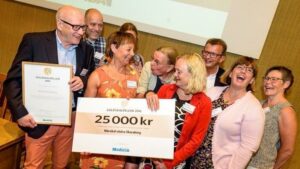AR+ Knowledge Action Democracy Collaborative
AR+ Knowledge Action Democracy Collaborative – Convened in January 2016, AR+ KADC continues to bring together ambitious action research institutions for cross pollination and shared projects. We congratulate our Swedish members, Chalmers Institute for Health, stewarded by Svante Lifvegren, MD, PhD., for their recent Gold Scalpel prize in recognition of their Networked Care Model for patients with complex care needs. This service innovation is based on a long term action research initiative in which all stakeholders – communities, hospitals, primary care units, actions researchers, patients, politicians – have been involved. The jury congratulated the CHI team.

“This initiative is an extensive and persistent pioneering work that has taken on the greatest healthcare challenge of today – integrating and coordinating care across organizational boundaries to fulfill the complex care needs of elderly patients.” This ensures that their action research learning platforms will spread!
“The learning platforms are a form of ‘stakeholder show and tell,’ where process owners from different healthcare projects update their colleagues on their experiments and take feedback on next best steps. The patient experience is either directly represented with patients at the meetings or patients’ voice and perspective is indirectly represented by other stakeholders Overtime the learning platforms permit genuine dialogue and discourage posturing and defensiveness. For example, those involved in cancer care sought to improve cancer patients’ experience generally, deciding to focus on patient experience of new cancer diagnosis. The process owner, a healthcare provider with 20% of her time paid for project coordination, experimented with the action research practice known as “photovoice” which invites stakeholders to use photos to illustrate their concrete concerns. Thus patients photographed life immediately after diagnosis, suggesting changes they experienced not just in their health but also in their social life. The process owner was able to bring these patient photos directly to a learning platform meeting which included hematology and oncology representatives. Their conversation about patient experience allowed them see places for improvement, expanding beyond sole consideration of health to include the larger patient context. In another experience of the same group, cervical cancer screening rates were significantly improved through the process owner’s involving local immigrant group leaders. In that case, the learning platform discussions confronted the thorny issue of sharing control for healthcare education with groups heretofore not yet trusted by the healthcare providers. Implicit knowledge becomes explicit in conversation so that experiments are continuously formulated, never pushing the system too far, too fast.” – From Bradbury & Lifvergren, 2016, forthcoming. Healthcare Management Forum.
- Three stories we did not tell about NGO-Community Collaboration in Uganda - April 18, 2024
- Podcast on PAR Peacebuilding in Colombia - April 15, 2024
- Julian Hauer’s Workshop– thinking wider and deeper - April 15, 2024
